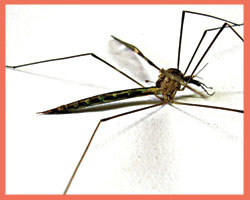This summer's frequent rain has made my grass lush, my flowers radiant, and my vegetable garden a sight to behold. Unfortunately, the rain has also led to a bumper crop of mosquitoes, to the point that I can barely stand to be outside long enough to survey my beautiful lawn.
Short of bathing in DEET and hoping that it won't mutate my DNA, I'm not exactly sure how to fight this battle. Even long sleeves and pants don't seem to work; they bite right through them!
As it turns out, I may have fallen victim to some urban legends regarding DEET.
Apparently, it is not as scary as I thought. According to an article published in Popular Science in June 2014, DEET's reputation may have been negatively influenced by people confusing it with the insecticide DDT, and from a number of stories published in the 1950s about DEET causing problematic side effects in the nervous systems of several children (who may have ingested it in large quantities). Scare tactics used by manufacturers of alternative repellent products may also add to this negative perception.
In a 2014 review, the Environmental Protection Agency reported, "EPA continues to believe that the normal use of DEET does not present a health concern to the general population, including children. As always, consumers are advised to read and follow label directions in using any pesticide product, including insect repellents." To read this review, click here.
For DEET to be most effective, it should be used in concentrations of twenty to thirty percent. Products differ vastly in concentrations, so check labels, and apply according to instructions. While some companies may offer fifty to one hundred percent concentrations, that's overkill ... unless you're heading into a West Nile infested swamp for the day. Be sure not to ingest DEET or get it into your eyes. Low levels of toxicity have been tied to overexposure and ingestion. When applying it to children, be sure not to apply it to parts of their body that may end up in their mouth, and don't apply more than the recommended amount. Bathing before bed and washing children's clothing can also limit their exposure. As with any substance, some individuals may experience allergic reactions when exposed to DEET. Note: DEET damages synthetic fibers, so be careful about spraying it on clothing, sunglasses, et cetera.
If you are one of that unfortunate bunch whose skin reacts to DEET, or if you're worried about the safety factor, there are some alternatives that have been shown to repel mosquitoes:
Picaridin (also known as Icardin) was approved by the EPA in 2005 for use in insect repellants. Certain varieties of Cutter, Repel, Avon Skin-So-Soft, Natrapel, and other brands contain this active ingredient. Both the World Health Organization (WHO) and Centers for Disease Control (CDC) recognize Picaridin as an effective insect repellant with minimal health risks. Oil of Lemon Eucalyptus, refined to p-menthane-3, 8-diol, or PMD, has also been approved by the EPA, and recognized by the CDC as an effective repellent. Varieties of Repel, Coleman, and other brands use Oil of Lemon Eucalyptus as their active ingredient.
And if you'd prefer not to put on any repellant at all, try these tips:
- Bring a fan out to the deck, point it at yourself, and turn it on high. The breeze will help dissipate your carbon dioxide, which attracts mosquitoes, and they can't fly in a breeze of more than ten miles per hour.
- Eliminate their breeding grounds. Get rid of standing water in buckets, kiddie pools, et cetera, or use "mosquito dunks" to kill the larvae.
- Rosemary and lavender are both believed to repel mosquitoes. Grow them as potted plants, and when you grill, throw a sprig or two on the barbecue to permeate the air with their scent.
Written by: Jennifer Reynolds is the staff writer for West Michigan Woman.




